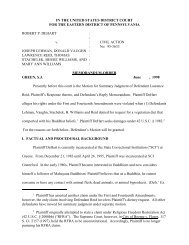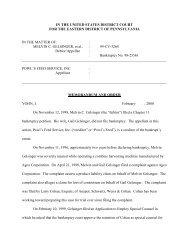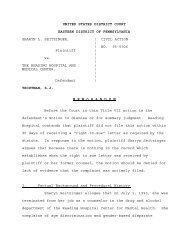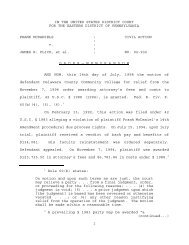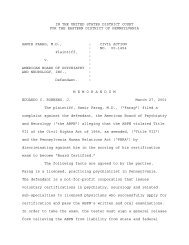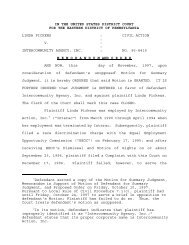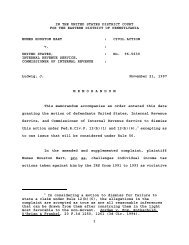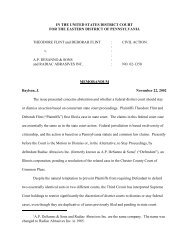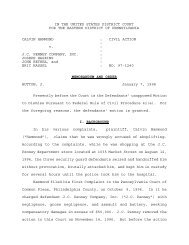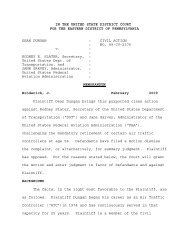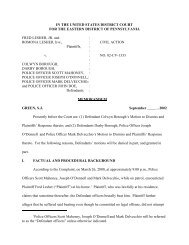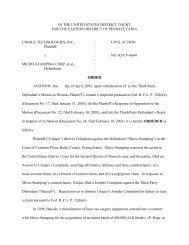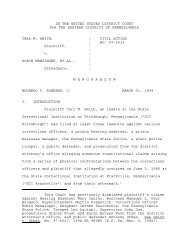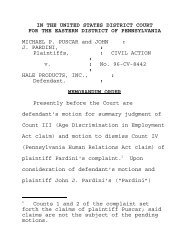FOR THE EASTERN DISTRICT OF PENNSYLVANIA George J
FOR THE EASTERN DISTRICT OF PENNSYLVANIA George J
FOR THE EASTERN DISTRICT OF PENNSYLVANIA George J
Create successful ePaper yourself
Turn your PDF publications into a flip-book with our unique Google optimized e-Paper software.
IN <strong>THE</strong> UNITED STATES <strong>DISTRICT</strong> COURT<br />
<strong>FOR</strong> <strong>THE</strong> <strong>EASTERN</strong> <strong>DISTRICT</strong> <strong>OF</strong> <strong>PENNSYLVANIA</strong><br />
<strong>George</strong> J. Young, Sr. and<br />
: CIVIL ACTION<br />
Gladys I. Young, husband and wife :<br />
:<br />
v. :<br />
:<br />
James Keith Sullwold, Jr. and :<br />
Royster Trucking, Inc., : NO. 00-2923<br />
MEMORANDUM AND ORDER<br />
Norma L. Shapiro, S.J. September 27, 2000<br />
The defendants, a trucking company and its employee, move to<br />
dismiss plaintiffs’ complaint for improper venue and lack of<br />
personal jurisdiction. The plaintiffs oppose, or, in the<br />
alternative, request that the court transfer the action to a<br />
proper venue pursuant to 28 U.S.C. § 1406. Finding that this<br />
court lacks personal jurisdiction over both defendants and that<br />
venue is improper in this judicial district, the action will be<br />
transferred to the United States District Court for the Northern<br />
District of Iowa.<br />
BACKGROUND<br />
Plaintiffs <strong>George</strong> and Gladys Young allege they were injured<br />
when a truck driven by defendant Sullwold, an employee of<br />
defendant Royster Trucking, collided with plaintiffs’ mobile<br />
home. The accident occurred on June 23, 1998 on Highway 71, in<br />
or around Greenville, Iowa.<br />
Plaintiffs are residents of Pennsylvania. Defendant Royster
Trucking is incorporated in Iowa with its principal place of<br />
business in Iowa. Defendant Sullwold is a resident of Waukee,<br />
Iowa. This court has subject matter jurisdiction based upon the<br />
diversity of the parties. See 28 U.S.C. § 1332(a)(1).<br />
DISCUSSION<br />
Defendants move to dismiss this action pursuant to Rule<br />
12(b)(2)-(3) of the Federal Rules of Civil Procedure for lack of<br />
personal jurisdiction and improper venue.<br />
(A)<br />
Personal Jurisdiction<br />
Under Federal Rule of Civil Procedure 4(e), a federal court<br />
may assert personal jurisdiction over a nonresident defendant to<br />
the extent permitted by the law of the state in which the court<br />
sits. The law of Pennsylvania authorizes courts in the state to<br />
exercise jurisdiction over nonresidents “to the fullest extent<br />
allowed under the Constitution of the United States.” 42 Pa.<br />
C.S.A. § 5322(b). This provision directs a court to exercise<br />
jurisdiction over any nonresident defendant, so long as the<br />
exercise comports with the due process requirements of the<br />
Fourteenth Amendment.<br />
Due process requires that the defendant have “certain<br />
minimum contacts with [the forum state] such that the maintenance<br />
of the suit does not offend traditional notions of fair play and<br />
substantial justice.” International Shoe v. Washington, 326 U.S.<br />
310, 316 (1945)(citations omitted). If the claims presented<br />
2
arise out of the defendant’s activity in the forum state, the<br />
defendant need only have minimum contacts with that forum for the<br />
court to exercise personal jurisdiction. See Schwilm v.<br />
Holbrook, 661 F.2d 12, 14 (3d Cir. 1981); Surgical Laser<br />
Technologies, Inc. v. C.R. Bard, Inc., 921 F. Supp. 281, 283<br />
(E.D. Pa. 1996). If the claims do not arise from a defendant’s<br />
forum related activity, a higher standard applies: plaintiff must<br />
demonstrate that the defendant maintains “continuous and<br />
substantial” contacts with the forum before a court may exercise<br />
personal jurisdiction. Reliance Steel Products v. Watson, Ess,<br />
Marshall & Enggas, 675 F.2d 587, 588-589 (3d Cir. 1982)(citations<br />
omitted); see also Rittenhouse & Lee v. Dollars & Sense, Inc.,<br />
1987 WL 9665 (E.D. Pa. 1987).<br />
The claims of the plaintiffs <strong>George</strong> and Gladys Young bear no<br />
relationship to any contact the defendants have with<br />
Pennsylvania. The claims arise from an automobile accident that<br />
occurred in Iowa. For this court to exercise personal<br />
jurisdiction over the defendants, plaintiffs must establish that<br />
each of the defendants maintains continuous and substantial<br />
contacts with Pennsylvania. Plaintiffs bear the burden of<br />
producing evidence demonstrating the substantial contacts of each<br />
defendant with Pennsylvania, but, where a conflict arises the<br />
court must consider the pleadings and affidavits in the light<br />
most favorable to the plaintiffs as the non-moving party. Lieb<br />
3
v. American Pacific International, Inc., 489 F. Supp. 690, 694<br />
(E.D. Pa. 1990); see also Gehling v. St. <strong>George</strong>’s Sch. of Med.,<br />
773 F.2d 539, 542 (3d Cir. 1985).<br />
(1) Defendant Sullwold<br />
Plaintiffs’ complaint fails to allege jurisdiction over<br />
defendant Sullwold, a resident of Waukee, Iowa. Plaintiffs have<br />
not produced any evidence demonstrating that defendant Sullwold<br />
has any contacts with Pennsylvania. Plaintiffs appear to claim<br />
the residency and contacts of Sullwold are irrelevant because he<br />
was acting as an employee of defendant Royster Trucking at the<br />
time of the accident, but personal jurisdiction over an employee<br />
does not automatically follow from jurisdiction over his<br />
corporate employer. See Keeton v. Hustler Magazine, 465 U.S.<br />
770, 781 n.13 (1983); Rush v. Savchuk, 444 U.S. 322, 327-29<br />
(1980). Without any evidence of contacts with this state or the<br />
agreement of defendant Sullwold, the court may not assert<br />
jurisdiction over him.<br />
(2) Defendant Royster Trucking<br />
Plaintiffs claim that defendant Royster Trucking has<br />
sufficient contacts with Pennsylvania for the proper exercise of<br />
personal jurisdiction. Plaintiffs assert that Royster Trucking<br />
holds itself out as a transporter of goods willing to deliver<br />
anywhere in the country. They offer as evidence of this<br />
willingness the affidavit of Deborah K. Schaffer. Ms. Schaffer<br />
4
avers that she contacted Royster Trucking about the possibility<br />
of transporting her belongings from South Dakota, through<br />
Pennsylvania, to New Jersey. An agent of Royster Trucking, by<br />
quoting her a price for the job, tacitly acknowledged that<br />
Royster would drive through Pennsylvania, availing itself of<br />
State facilities such as the roadways. In response, the<br />
president of Royster Trucking avers in his affidavit that his<br />
company no longer makes deliveries in Pennsylvania and has not<br />
sent a truck through Pennsylvania since October, 1999.<br />
Even taken in the light most favorable to the plaintiffs,<br />
the evidence produced does not show that defendant Royster<br />
Trucking has had substantial and continuous contacts with<br />
Pennsylvania. To constitute continuous and substantial contacts,<br />
the plaintiff must “show that [the defendants] carry on a<br />
continuous and systematic part of their general business within<br />
this Commonwealth.” Gehling v. St. <strong>George</strong>’s Sch. of Med, 773<br />
F.2d 539, 541 (1985)(citing 42 Pa. C.S.A. § 5301(a)(2)(iii)).<br />
Plaintiffs’ evidence at best shows that defendant Royster<br />
Trucking occasionally might have been willing to travel through<br />
Pennsylvania. Plaintiff has not produced any evidence that<br />
Royster Trucking has traveled through Pennsylvania continuously<br />
or that Royster’s activities in Pennsylvania constitute a<br />
substantial part of the defendant’s business. This court has no<br />
personal jurisdiction over defendant Royster Trucking.<br />
5
(B) Venue<br />
Under 28 U.S.C. §1391(a), in a diversity action venue lies<br />
in either: (1) a district in which any defendant resides if all<br />
defendants are from the same state; or (2) the district in which<br />
the events underlying the claim occurred. See 28 U.S.C. §<br />
1391(a)(1)-(2). Venue is not proper in this judicial district<br />
under either of these statutory provisions.<br />
This court cannot establish venue under §1391(a)(1) because<br />
neither defendant resides in this judicial district. Under<br />
§ 1391(c), a corporation is a resident of any judicial district<br />
in which it is subject to personal jurisdiction at the time the<br />
action is commenced. This court lacks personal jurisdiction over<br />
defendant Royster Trucking, so Royster trucking does not reside<br />
in this district. Defendant Sullwold also does not reside in<br />
this district; plaintiffs acknowledge that Sullwold resides in<br />
Iowa.<br />
Venue also cannot be established under § 1391(a)(2),<br />
granting venue in “a judicial district in which a substantial<br />
part of the events or omissions giving rise to the claim<br />
occurred.” It is undisputed that the car accident occurred in<br />
the Northern District of Iowa, not the Eastern District of<br />
Pennsylvania.<br />
If venue cannot be established in any judicial district<br />
under either §§ 1391(a)(1) or (2), the action may be brought in<br />
6
any district with personal jurisdiction over any defendant at the<br />
time the action is commenced. See id. at § 1391(a)(3).<br />
Defendants correctly assert that venue lies in Iowa under either<br />
§ 1391(a)(1) or (a)(2). 1 As this action might have been brought<br />
in a judicial district in Iowa under either of these provisions,<br />
this court may not entertain venue under § 1391(a)(3).<br />
(C)<br />
Forum Non Conveniens<br />
Plaintiffs claim that an Iowa judicial district is a forum<br />
non conveniens under 28 U.S.C. § 1404(a). Section 1404(a)<br />
states, “in the interests of justice, a district court may<br />
transfer any civil action to any other district or division where<br />
it might have been brought.” Plaintiffs argue that even if this<br />
action might have been brought in Iowa, it is such an<br />
inconvenient forum for the plaintiffs that the interests of<br />
justice require this court to permit the action to proceed in<br />
this forum. Plaintiffs submitted the affidavit of Gladys Young,<br />
who avers that the poor health of the plaintiffs makes their<br />
travel to Iowa very difficult. She also states that<br />
1<br />
Under §1391(a)(1) venue lies in any district where one of<br />
the defendants resides if all defendants are from the same state.<br />
Both defendants reside in Iowa. Defendant Royster Trucking is<br />
headquartered in Duncombe, Iowa, in the Northern District of<br />
Iowa, and venue could properly be established in that judicial<br />
district under § 1391(a)(1). Section §1391(a)(2) states that<br />
venue lies where the events giving rise to the claims occurred.<br />
The car accident giving rise to plaintiffs claims occurred in or<br />
around Greenville, Iowa, a town in the Northern District of Iowa.<br />
7
approximately ten Pennsylvania physicians have treated the<br />
plaintiffs and would have to be flown to Iowa to testify in<br />
person. Plaintiffs claim that the expense and inconvenience of<br />
bringing the action in Iowa should compel this court to allow the<br />
action to remain here.<br />
Section 1404(a) permits transfer only to a district in which<br />
the action “might have been brought.” As this court is without<br />
jurisdiction over the defendants, this is not a judicial district<br />
in which the action might have been brought. A court is not<br />
permitted to retain an action when it has no personal<br />
jurisdiction over the defendants merely for the convenience of<br />
the plaintiffs.<br />
(D) Transfer under 28 U.S.C. §1406(a):<br />
Plaintiffs propose that, should the court determine it<br />
cannot retain the action, it should not dismiss, but transfer the<br />
action to Iowa under 28 U.S.C. §1406(a). Section 1406(a) permits<br />
a district court to transfer an action in which the venue is<br />
improper to “any district or division in which it could have been<br />
brought.” Lack of personal jurisdiction over the defendants does<br />
not prevent a court from transferring an action under §1406(a).<br />
See Goldlawr v. Heiman, 369 U.S. 463, 465-66 (1962)(“Nothing in<br />
that language indicates that the operation of the section was<br />
intended to be limited to actions in which the transferring court<br />
has personal jurisdiction over the defendants.”).<br />
8
Both jurisdiction and venue lie in the Northern District of<br />
Iowa. See supra note 1. Iowa is the home state of both<br />
defendants, and the Northern District is the situs of the<br />
accident and the location of defendant Royster Trucking’s<br />
headquarters. It is in the interest of justice to transfer<br />
rather than dismiss this action.<br />
CONCLUSION<br />
Neither James Sullwold nor Royster Trucking are subject to<br />
personal jurisdiction in Pennsylvania. The actions of the<br />
defendants on which the claims are based did not take place here,<br />
and neither defendant maintains continuous and substantial<br />
contacts with the forum.<br />
The Eastern District of Pennsylvania is not a proper venue<br />
for the resolution of these claims. The accident on which the<br />
claims are based occurred in Iowa, and both defendants reside in<br />
Iowa.<br />
Transfer under section 1406(a) is appropriate and is within<br />
the sound discretion of this court. This action will be<br />
transferred to the Northern District of Iowa; defendants’ motion<br />
to dismiss will be denied.<br />
9
IN <strong>THE</strong> UNITED STATES <strong>DISTRICT</strong> COURT<br />
<strong>FOR</strong> <strong>THE</strong> <strong>EASTERN</strong> <strong>DISTRICT</strong> <strong>OF</strong> <strong>PENNSYLVANIA</strong><br />
<strong>George</strong> J. Young, Sr. and<br />
: CIVIL ACTION<br />
Gladys I. Young, husband and wife :<br />
:<br />
v. :<br />
:<br />
James Keith Sullwold, Jr. and :<br />
Royster Trucking, Inc., : NO. 00-2923<br />
ORDER<br />
AND NOW, this 27th day of September, 2000, in consideration<br />
of Defendant James Keith Sullwold, Jr. and Royster Trucking,<br />
Inc.s’ Motion to Dismiss Plaintiffs’ Complaint and Plaintiffs’<br />
Answer thereto, it is ORDERED that:<br />
1. Defendants’ motion is DENIED.<br />
2. Pursuant to 28 U.S.C. § 1406(a), this case is<br />
TRANSFERRED <strong>FOR</strong>THWITH to the Northern District of Iowa, a<br />
district in which it could have been brought.<br />
S.J.



